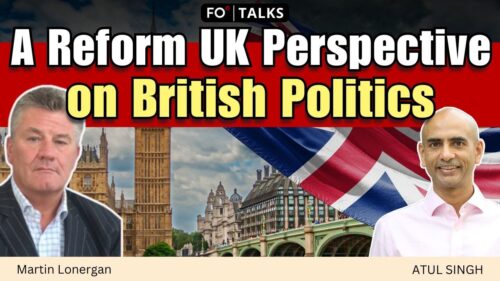I arrived in the UK in the autumn of 1996 to study law at Oxford. I came without knowing practically anyone in the country — a distant family friend who had met me just once before was kind enough to pick me up and drop me off at the university. I loved my time in the UK, the ease with which things got done and the general internationalism and intellectual and cultural avenues the country offered. The typically British values of fair play and rule of law influenced and impressed me greatly. Indeed, they inspired my decision to naturalize as a British citizen.
In the years since, I have lived in Hong Kong and Singapore as part of a London-based law firm. I visit London regularly, but each stay becomes more distressing. The standards of law and order have rapidly declined in the city. For decades, London’s preeminent reputation as both a financial center and a wonderful place to live was a direct result of the rule of law. This is no longer the case. Crime is rising fast. The decline in rule of law is only exacerbated by the successive governments that continue to ignore this issue.
From upstanding law to rampant crime
During my two years at Oxford, I was struck by the open and inquisitive mode of education in England, a welcome change from the generally regimented way of teaching I experienced in India. Unlike the chaos in which I grew up, I found myself in a law-abiding country where systems worked. This was in stark contrast to India, where connections were essential to get even the most basic things done. Even registering a First Information Report (FIR) at any police station required either a bribe or a connection.
I found law enforcement in the UK to be drastically different. For instance, when I got mugged walking down the street near Kilburn, London, the police arrived within minutes. They even drove me around the neighbourhood in an attempt to identify the suspects. Back then, the police demonstrated a sense of concern for residents, and citizens had faith in the system of governance.
I no longer have the same faith that I did two decades ago. Recently, I went through a harrowing experience of a criminal squatting in my flat and the arduous legal process of recovering my flat from him. This criminal had forged his identity documents and references to rent my flat. When my property manager, Hamptons, wanted to ask why the flat’s locks had been changed in violation of the rental agreement, the tenant made threats of “breaking the face” of the agent if he dared visit the flat.
Hamptons requested police assistance, but the police refused to help. They not only washed their hands off the event by claiming that physical assault was a civil matter, but also proceeded to say they were fearful for the safety of their officers. If the police are so afraid for their safety, then what message does it send to Londoners and British citizens?
Shortly after the incident, I told my old college friends what had happened. They mentioned another friend who had gone through the same harrowing experience. We exchanged stories and discovered that many others in our circle had gone through the same experience. Clearly, this sort of criminal behaviour is now rife in the UK and the police take no action against it. Crime now takes precedence over law and order.
Many stores in London hire private security to prevent shoplifting because the police consistently fail to intervene. Their inaction continues despite the fact that there are currently over 500,000 thefts a year in the country. The British Retail Consortium’s Crime Survey estimated that theft cost the retail sector $1.2 billion (£953 million) in losses in 2023. The Crime Survey also reveals that retail incidents, including racial and sexual abuse, physical assault and threats with weapons, rose from the pre-Covid high of over 450 incidents per day in 2019-2020 to over 850 per day in 2021-2022.
Not only has shoplifting been “effectively decriminalized,” but it seems even more heinous crimes such as rape are on the rise. In her 2020 report, the former victims’ commissioner Dame Vera Baird states that only 3% of rape reports resulted in the suspect being charged. In the following year’s report, Baird commented that the decline in prosecutions since 2016 can be attributed to a lack of agency in the justice system.
The government’s refusal to take charge deepens the issue
There are numerous articles claiming that there is no better time to be a criminal in the UK than now. Even if the criminals are unlucky enough to be convicted, the good news for them is that there probably isn’t even enough space to send them to prison. It’s a big deal for any government to lose its grip on law and order to this extent. The country is increasingly ungovernable. Citizens and businesses are having to hire their own private police forces, law enforcement does not take charge and victims of crime are refused justice. A friend remarks that living in the UK is like turning the Romans into Italians. I see the collapse of the rule of law as a sign of the UK regressing from a “developed” country into a “developing” one.
Sadly, ministers and politicians do not want to address the matter. I sent many emails about my flat saga to the authorities, including Prime Minister Keir Starmer and my local Member of Parliament (MP), Matthew Pennycook. My MP was unable to help. Pennycook offered me his sympathies but told me that the police’s powers are limited.
This is a shocking admission by a Labour MP about the collapse of the rule of law and the ineffectiveness of his own government. Once, Starmer was a prosecutor, and I expect his government to do better. Sadly, the Labour government Starmer is leading is presiding over an utter collapse of law and order.
[Cheyenne Torres edited this piece.]
The views expressed in this article are the author’s own and do not necessarily reflect Fair Observer’s editorial policy.
Support Fair Observer
We rely on your support for our independence, diversity and quality.
For more than 10 years, Fair Observer has been free, fair and independent. No billionaire owns us, no advertisers control us. We are a reader-supported nonprofit. Unlike many other publications, we keep our content free for readers regardless of where they live or whether they can afford to pay. We have no paywalls and no ads.
In the post-truth era of fake news, echo chambers and filter bubbles, we publish a plurality of perspectives from around the world. Anyone can publish with us, but everyone goes through a rigorous editorial process. So, you get fact-checked, well-reasoned content instead of noise.
We publish 3,000+ voices from 90+ countries. We also conduct education and training programs
on subjects ranging from digital media and journalism to writing and critical thinking. This
doesn’t come cheap. Servers, editors, trainers and web developers cost
money.
Please consider supporting us on a regular basis as a recurring donor or a
sustaining member.
Will you support FO’s journalism?
We rely on your support for our independence, diversity and quality.







Comment